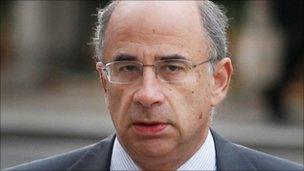Phone hacking: Daily Mail's Paul Dacre defends PCC
- Published
Daily Mail editor Paul Dacre: "This judicial inquiry has greater powers than those possessed by the public inquiry into the Iraq war"
Self-regulation is the "only viable way" of policing a free press, claims the editor-in-chief of the Daily Mail.
Paul Dacre made the comments during a seminar on press regulation held ahead of the start of Lord Justice Leveson's inquiry on phone hacking.
Former Sun editor Kelvin MacKenzie dismissed the inquiry as unnecessary.
He said he believed David Cameron had set it up to "escape his own personal lack of judgement" in hiring former News of the World editor Andy Coulson.
The seminar is looking at issues surrounding media conduct, the future of self-regulation and ways to address breaches of standards.
In his speech, held at the QE2 Conference Centre in Westminster, Mr Dacre said: "Such practices (phone hacking) are a disgrace and have shocked and shaken us all.
"They need to be purged from journalism and reforms instigated to prevent such criminal activities ever happening again."
Mr Dacre said although the PCC was "naive" in its investigation of phone hacking, it was unfair to suggest the scandal proved the PCC did not work.
"The truth is that the police should have investigated this crime properly and prosecuted the perpetrators," he said.
"If phone hacking results in the abolition of the PCC, then logically it should result in the abolition of the police and the CPS (Crown Prosecution Service)."
Mr Dacre announced that a new corrections and clarifications column would be published on page two of all Associated Press newspapers.
Fleet Street culture
Mr Dacre, who is the editor-in-chief of Associated Press which publishes the Daily Mail, Mail on Sunday and the Metro newspapers, also accused politicians of seeking revenge on newspapers by criticising the measures taken to investigate phone hacking.
He said the judicial inquiry had more powers than the Chilcot Inquiry which looked into the Iraq War.
The editor talked of the "rank smells of hypocrisy in the political class's current moral indignation over the British press that dared to expose their greed and corruption".
Mr Dacre said the Press Complaints Commission had changed the "culture of Fleet Street" and its Editors' Code was strictly adhered to.
He said self-regulation in a "beefed-up form" would be the "only way of preserving the freedom of the press", and if reforms were to happen, then he preferred the idea of a newspaper ombudsman who could deal specifically with press standards.
'Political friendship'
In his speech to the seminar, Mr Mackenzie criticised the prime minister's relationship with Rupert Murdoch.
He said Mr Cameron was "the daddy of them all" when it came to cosying up to Mr Murdoch and the Leveson inquiry was pointless.
"This is the way our prime minister, our prime minister is hopeful he can escape his own personal lack of judgement.
"He knows and Andy knows [Mr Coulson] should never have been hired into the heart of government.
"I do blame Cameron's lack of judgement in offering it to him. It was clearly a gesture of political friendship aimed over Andy's head to Rupert Murdoch," he said.
Speaking at a debate on maintaining standards, Trinity Mirror chief executive Sly Bailey said the company had a series of "common sense" guidelines, and carried out detailed assessments of risks, with a series of checks and good management that cascaded down through the company.
But she said no system of corporate governance, however well thought through and rigorously applied, could be "completely bomb-proof", and it was about minimising the risks of wrong-doing.
Trinity Mirror had a series of editorial procedures and had recently engaged in a thorough review of editorial controls and procedures, she added.
The seminar is the latest of several sessions held as part of the Leveson Inquiry, although the information given at the meetings will not form part of the inquiry.

Lord Justice Leveson's inquiry will look into the culture, practices and ethics of the press
The Leveson Inquiry will see 46 "core participants" who believe they have been the victim of media intrusion - including JK Rowling, Abi Titmuss, Chris Jeffries, the family of Milly Dowler and the parents of Madeleine McCann - voice their opinions on phone hacking and press standards.
Last week, in a seminar which looked at the competitive pressures on the press and the impact on journalism, former News of the World editor Phil Hall said pressure to produce big stories had not led to phone hacking and a drop in standards.
In a second seminar, on the Rights and Responsibilities of the Press, Guardian editor Alan Rusbridger urged the inquiry to remember "how the freedoms won here became a model for much of the rest of the world", and "how the world still watches us to see how we protect those freedoms".